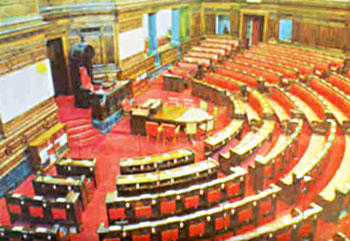 The Prime Minster of India is the real head of the Indian Union. As a result a lot of duties have been vested upon him. He serves a multiple role in the Indian Union.
The Prime Minster of India is the real head of the Indian Union. As a result a lot of duties have been vested upon him. He serves a multiple role in the Indian Union.
Article 78 of the constitution specifies the duties of the Prime Minister. It shall be the duty of the Prime Minister:
(a) To communicate to the President all decisions of the Council of Ministers relating to the administration and legislation;
(b) To furnish such information as the President may call for;
(c) To submit for the consideration of the Council of Ministers any matter desired by the President.
The Prime Minister of India has been assigned the following roles:
Leader of the Nation
The leader of the Lok Sabha selected by the political party which secures an absolute majority in the Lok Sabha, assumes the office of the Prime Minister. The Prime Minister maintains the unity and integrity of the nation and offers leadership at the time of national crisis. It is found that at the hour of national crisis the entire nation, forgetting their political differences, stands by the Prime Minister. On various national issues and national problems which the nation faces the Prime Minister makes every endeavour to arrive at a national consensus as a true national leader. Hence, the Prime Minister has got to be a national leader and leader of the people instead of being only a Party leader. The Prime Minister also serves as a leader of the party or of the coalition which forms government at the Centre. He is also the leader of the Lok Sabha or of the House of the People. It is the Prime Minister who is also the leader of the Council of Ministers who advises the President and executes the governance of the country.
Leader of the Cabinet
The Prime Minister is largely and mainly responsible for the success or failure of the Government of India. He presides over the Cabinet meetings. He allocates portfolios among the ministers, and acts as a coordinator between them. He can transfer a minister from one department to another, and if necessary, may ask any minister to resign.
Although all the cabinet members stand on equal footing and speak with equal voice, yet the head of the Cabinet is the Prime Minister who occupies a position which so long as it lasts, is one of exceptional authority and preponderance.
Chief Adviser to the President
The Prime Minister is the President`s chief adviser. Under Article 78 of the Constitution it is the duty of the Prime Minister to communicate all decisions of the Council of Ministers and the Cabinet and all proposals for legislation to the President. The Prime Minister communicates to the President all the information called for by him, and if so desired by the President, submits any matter for reconsideration of the Council of Ministers.






